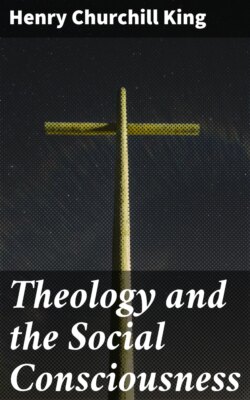Читать книгу Theology and the Social Consciousness - Henry Churchill King - Страница 8
На сайте Литреса книга снята с продажи.
II. THE SENSE OF THE MUTUAL INFLUENCE OF MEN
ОглавлениеA second element in the social consciousness, and, perhaps, that which has most of all characterized it through the larger period of its growth, is the strong sense of the mutual influence of men—that we are all "members one of another."
1. Contributing Lines of Thought.—It is worth seeing how firmly planted the idea is. Several lines of thought have united to induce men to emphasize—perhaps even to over-emphasize—this way of thinking of society. The influence of natural science, in the first place, has been inevitably in this direction. Its root idea of the universality of law forces upon one the thought of a world which is a coherent whole, a unity with universal forces in it, in which every part is inextricably connected with every other. So, too, the acceptance of the theory of evolution has led science to regard the whole history of the physical universe as an organic growth.
Psychology, also, with its present-day emphasis, in Baldwin and Royce, upon the constant presence and fundamental character of imitation, and its insistence upon the still more fundamental impulsiveness of consciousness which Dewey believes underlies imitation,[3] is really proclaiming exactly this element of the social consciousness. And the whole assertion by the later psychology of the unity of man—mind and body, and of the complex intertwining of all the functions of the mind, is in closest harmony with a similar view of society.
Philosophy, too, is exerting all along a half-unconscious pressure toward the thought of the organic unity of society. That philosophy may exist at all, it must start from the assumption of a universe, a real unity of truth, and its problem is to find a discerned unity. It knows no unrelated being, and, consequently, whether it theoretically accepts the formulation or not, it must admit that, as a matter of fact, to be is to be in relations. It asserts as a universal fact, what natural science and psychology both affirm in their own respective spheres, the concrete relatedness of all. It cannot well deny the same thought when applied to society. Its repeated attempts, moreover, to conceive all as a developing unity, and the profound influence of the analogy of the organism upon its history, both further sustain the organic view of society.
Christianity, as well, has been a powerful factor in this direction from the beginning, for it really first gave the Idea of Humanity.[4]
2. The Threefold Form of the Conviction.—Sustained, now, by all these movements in natural science, psychology, philosophy, and Christianity, this thought of the mutual influence of men has taken three forms: that mutual influence is inevitable, isolation impossible; that mutual influence is desirable, isolation to be shunned; that mutual influence is indispensable, isolation blighting.
(1) This second element in the social consciousness has meant, then, in the first place, a growing sense of the inevitableness of the mutual influence of all men, and of all classes of men; that we are all parts of one whole, each part unavoidably affected by every other; that we are bound up in one bundle of life with all men, and cannot live an isolated life if we would; that we do influence one another whether we will or not, and tend unconsciously to draw others to our level and are ourselves drawn toward theirs; that we joy and suffer together whether we will or not, and grow or deteriorate together.
(2) But the mutual influence of men means more than this: not only that we do inevitably affect one another in living out our own life, but a growing sense of the fact that we are obviously not intended to come to our best in independence of one another; that we are made on so large a plan that we cannot come to our best alone; that we are evidently made for personal relations, and that, therefore, largeness of life for ourselves depends on our entering into the life of others.
(3) But even more than this is true. It is not only that entering into the life of others is a help in my life, it is the great help, the one great means, the indispensable, the essential condition of all largeness of life; it is the very meaning of life—life itself. We are to find our life only in losing our life. Life is the fulfilment of relations. When we try to run away from the variety and complexity of these relations, we are running away from life itself. The indispensableness of these relations to others is assumed, also, in the assertion by the sociologist of an evolution toward a society, at once more and more complex, and more and more perfect.
But if I grow in the growth of another, the other grows in my growth. If the only thing of value that I can finally give is myself, the value of that gift depends upon the largeness and richness of the self given. For love's own sake, therefore, I must grow, must strive to bring to its highest perfection that work which is given me to do. A person is a social being called to contribute to the whole, in the line of his own best possibilities. One's largest ministry to others is to be rendered, then, through sacred regard for one's own calling, considered as exactly his place of largest service. Or, to put it the other way: I can come to my best only in work so great and in associations so large that I may lose myself in them in perfect objectivity.
The mutual influence of men, therefore, is unavoidable, is desirable, is indispensable; isolation impossible, hindering, blighting. This is the true solidarity of the race, in which there is no fiction, no hiding in the inconceivable, and no pretense.
